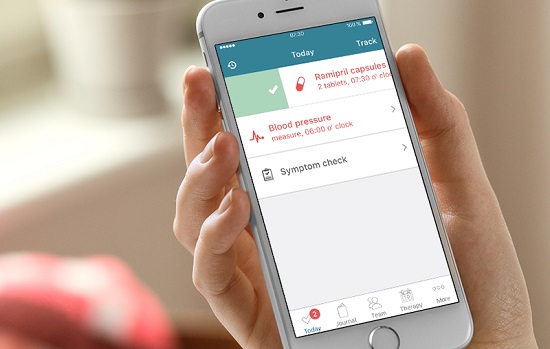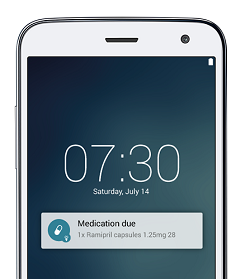Keeping Your Heart in Shape: An App to Help You Manage Congestive Heart Failure
Look After Your Heart and Your Health by Adhering to Your CHF Treatment Plans with MyTherapy - A Free Medication Reminder and Health Tracker App

Contrary to what the name suggests, congestive heart failure (often simply referred to as heart failure or abbreviated as CHF) doesn’t mean that the heart has stopped working. It simply means that the heart’s pumping power is weaker than normal. This means that blood circulates through the heart and body at a slower rate and the heart therefore cannot pump enough oxygen and nutrients to meet the body’s needs. In a healthy human heart, the cardiac output should be around 4,900 ml/minute. With CHF, the body retains more fluid than usual, causing it to become congested (hence the term congestive heart failure). CHF is a chronic, progressive condition and specifically refers to the stage in which fluid builds up around the heart. CHF develops when your ventricles (the lower half of your heart) fail to pump a sufficient volume of blood to the body.
If you think you have CHF, you should seek immediate medical treatment as it can be life-threatening. The good news is that CHF can be treated using different types of treatments, which include ACE (angiotensin-converting enzyme) inhibitors, beta-blockers, and diuretics. These medications help control the symptoms and slow down the progression of the condition. Also, new tablets on the market, such as Novartis’ Entresto (sacubitril/valsartan) or Amgen’s Corlanor (ivabradine), have proven to be highly effective and beneficial. In addition to taking medication, it is also crucial that if you have CHF, you adhere to a heart-healthy lifestyle by eating the right kinds of foods and getting exercise.
Naturally, it can be difficult to remember the various medicines that you will need to take regularly and responsibly - especially if you need to take different doses at different times during the day. Furthermore, adherence to your medication is essential if you want to stay healthy and manage your condition. Smartphone apps, like MyTherapy, can offer you support in this regard.
So how does MyTherapy work? Well, for starters, the app generates pill reminders that can be personalized to specify when and how a particular drug must be taken. All you have to do is upload the relevant medication data (by either using the app’s built-in barcode scanner or medication database) and setting specific times and doses according to prescribed instructions and the app will do the rest by reminding you via an alarm and pop-up notifications. In this way, MyTherapy turns the challenging task of adhering to medicine into a simple, everyday to-do list, which can be ticked off as the day goes by. In addition to this reminder function, the app also comes with a digital health diary. With this diary, you can monitor your health and well-being by recording your symptoms, medication side-effects, and measurements such as blood pressure, and weight. From your logged data, you can print out a monthly health report (which is complied into easy-to-digest graphs) and share with your doctor. This ensures that your doctor can get a good overview of how you are doing and help him/her change your treatment if needs be.
MyTherapy is consistently developed by user-feedback, ensuring that the app meets the needs of our users at all times. Smartpatient, the company behind MyTherapy, also adheres to strict privacy laws, so you never need to worry about your personal data being unprotected. The app, with its user-friendly design, is suitable for anyone of any age.
What Causes CHF?
Congestive heart failure (CHF) is a chronic condition in which the pumping power of the heart progressively worsens. It is sometimes simply referred to as “heart failure”. The heart is divided into four chambers: two upper chambers (the atria) and two lower chambers (the ventricles). While the atria receive blood as it returns from the body, the ventricles are responsible for pumping the blood out of the heart to organs and tissues. CHF can either affect the left ventricle, right ventricle, or both ventricles. Over time, the ventricles become too weak or too stiff to pump enough oxygen-rich blood through the body. This means that the organs and tissues do not receive enough oxygen or nutrients. Moreover, blood and other fluids start building up in various parts of the body, such as in the lungs, liver, legs, and feet. The condition can lead to various complications like kidney and liver damage and heart valve and heart rhythm problems. For this reason, it is necessary to seek medical help as soon as possible.
The Main Signs of CHF
In the beginning stages of CHF, you won’t necessarily notice any changes in your health. If the condition progresses, however, you will start to notice gradual changes in your body. If you develop acute CHF, your symptoms will develop more quickly. The main signs and symptoms of CHF include:
- Breathlessness
- Fatigue
- Swollen ankles or legs
- Persistent cough or wheezing
- Increased need to urinate, especially at night
- Sudden weight gain
- Lack of appetite
- Nausea
- Difficulties concentrating
- Shortness of breath, which may indicate pulmonary edema
Symptoms that indicate a severe heart condition include chest pain, rapid breathing, skin that appears blue, and fainting.
Most Common Types of CHF and Diagnosis
Left-sided CHF is the most common type of CHF and there are two kinds of left-sided heart failure: systolic (where the left ventricle fails to contract properly) and diastolic (where the muscle in the left ventricle stiffens). In right-sided CHF, the right ventricle struggles to pump blood to the lungs, causing blood to back up in the blood vessels. It is possible to have left-sided and right-sided CHF simultaneously. Watch this video for more info on left-sided and right-sided heart failure.
Depending on what ventricle is affected, your symptoms may vary. In left-sided CHF, fluid leaks into the lungs, which mainly causes shortness of breath. In right-sided CHF, blood and fluid congest the veins, resulting in swelling of the lower extremities and abdomen. If you experience any of these symptoms, you should seek help immediately. Your doctor will then ask you about your medical history and perform a physical examination. The various tests that can help your doctor diagnose CHF include blood tests to check for abnormal blood cells, an electrocardiogram (ECG) to record the heart beat, or an echocardiogram to record the structure and motion of the heart.
Various conditions May Cause CHF
In many cases, CHF develops after the heart has been damaged by other conditions. The following conditions may lead to CHF:
- Coronary heart disease: this occurs when the arteries, which supply the heart with blood and nutrients, get clogged up with a fatty substance in a process known as atherosclerosis. This can cause angina or heart attacks.
- High blood pressure (hypertension): this occurs when the blood vessels are restricted by fatty substances and cholesterol.
- Heart rhythm problems: these may include atrial fibrillation.
- Cardiomyopathy: damage that affects the muscle of the heart (for example through infections, alcohol, or drug abuse).
- Damage to the heart valves: heart valves that do not open or close properly will put extra strain on the ventricles.
- Congenital heart disease: these are birth defects that affect a person’s heart.
CHF Treatment Options
The aim of treating CHF is to slow down the progression of the condition and to control the symptoms as much as possible. This can often be achieved with a combination of medication, lifestyle changes, and – in some cases – surgery.
Various medicines can help treat CHF. They can cause side-effects and should only be taken after consulting your GP or heart specialist. Common medications for CHF include:
- Angiotensin-converting enzyme (ACE) inhibitors: these drugs relax and open the blood vessels, making it easier for the heart to pump blood through the body. Common ACE inhibitors include ramipril, captopril, enalapril, lisinopril, and perindopril.
- Beta-blockers: these medicines reduce the effect of certain hormones that accelerate the heartbeat. The main beta blockers to treat CHF include bisoprolol, carvedilol, and nebivolol.
- Angiotensin-receptor blockers (ARBs): these work in a similar way to ACE inhibitors, but have different side effects.
- Ivabradine: this is often used as an alternative to beta-blockers if they cause troublesome side-effects.
- Diuretics and aldosterone antagonists: these drugs help you get rid of fluids that have built up in the body.
- Sacubitril: this is a new type of medication that combines ARBs and a neprilysin inhibitor. It is mostly recommend for people with severe CHF.
- Digoxin: this drug can strengthen the heart muscle and slow down the heart rate, thereby improving the symptoms of CHF. It is derived from the foxglove plant and is usually only recommended for patients who do not respond to other types of medication.
In addition to medication, it is important to make healthy lifestyle changes to reduce your symptoms. For example, stopping smoking, eating a healthy and balanced diet, exercising regularly, and reducing alcohol consumption can all prevent serious illness. In some cases of CHF, more invasive procedures are necessary. Some patients receive a pacemaker – a small implant – to control the heartbeat or have surgery to increase the efficiency of the heart.
Your Heart and MyTherapy
Congestive heart failure is a condition that causes unpleasant symptoms and serious complications. It can, however, be managed by making lifestyle changes and following a medication plan strictly. Adhering to lifestyle changes and the medication can be difficult, so it is important to get all the help and support you can. MyTherapy is one such form of support. With its reminders for both medication intake and doctors’ appointments and its built-in health diary, the app can help you adhere to your medication and lifestyle changes, thereby improving your overall well-being. Medication can only help if you take it and take it responsibly, so let MyTherapy help you and your heart by taking care of your medication adherence.
Sources
- bme240.eng.uci.edu
- www.nhs.uk/Conditions/Heart-failure
- www.healthline.com/health/congestive-heart-failure
- www.heartfailure.org/heart-failure
- www.khanacademy.org
- www.mayoclinic.org/diseases-conditions/heart-failure
- www.medicinenet.com/congestive_heart_failure
- www.webmd.com/heart-disease
- www.heart.org/HEARTORG/Conditions/HeartFailure


